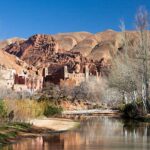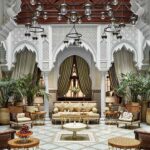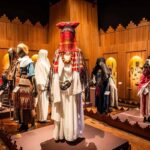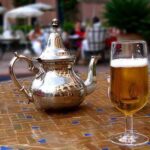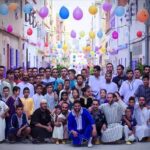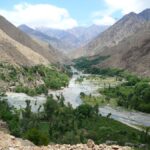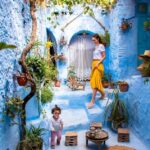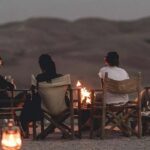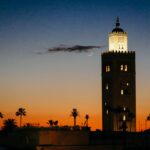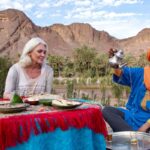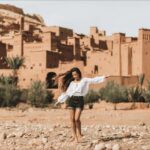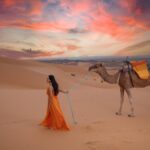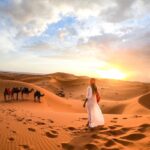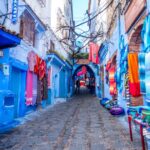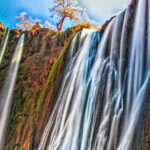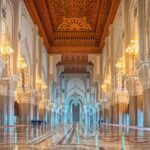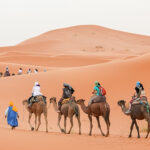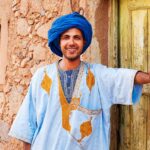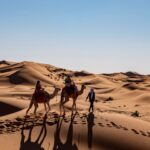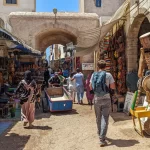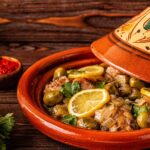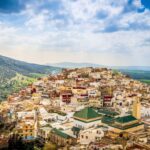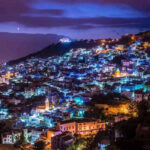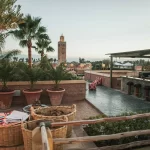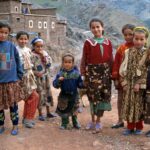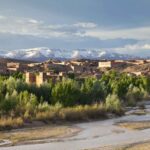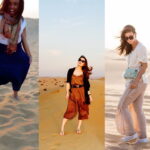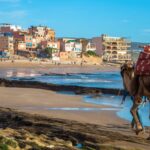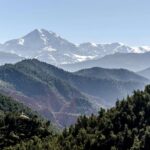Morocco boasts a vibrant population, rich in its diversity of Arab and Berber heritage. The profound impact of Islam on daily life is particularly evident during the sacred month of Ramadan.
While the nation is renowned for its scorching climate, the inland Atlas Mountains offer a mesmerizing spectacle with annual snowfalls, rendering them an irresistible destination for visitors.
As a politically stable kingdom, Morocco demonstrates resilience, yet progress in terms of reforms moves at a gradual pace.
Table of contents
- The People of Morocco: Diversity and Cultural Heritage
- Languages in Morocco: A Linguistic Tapestry
- Moroccan Climate: From Coast to Inland
- Morocco’s History at a Glance
- Moroccan Culture: A Tapestry of Influences
- Social Life in Morocco: A Blend of Tradition and Modernity
- Respecting Islamic Traditions: Islam and Ramadan in Morocco
- Moroccan Cuisine
- Dinner ceremonies
- Morocco Everyday Life
- Money in Morocco
The People of Morocco: Diversity and Cultural Heritage
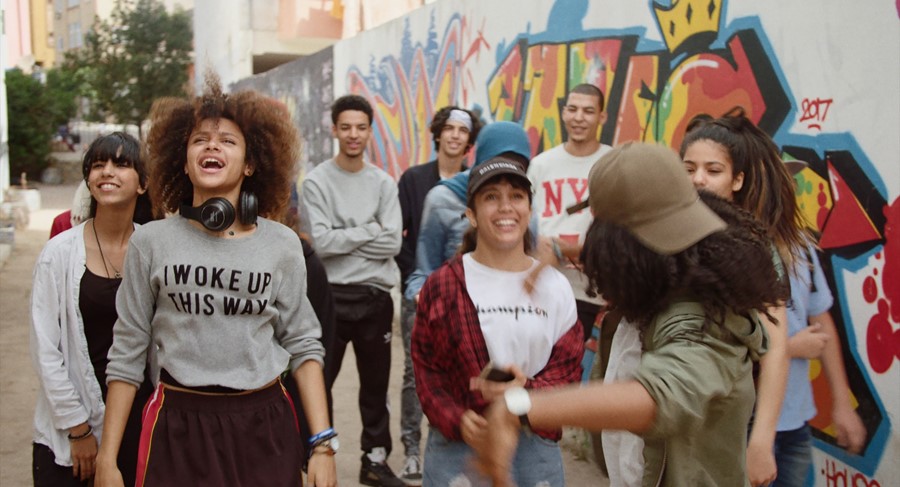
With a vast land area spanning 446,550 km2, Morocco is home to approximately 33.8 million people as of July 2014. Most of the populace resides in urban areas, surpassing the half mark. Notably, the region of Atlantic Morocco, renowned for its fertile coastal plains and plateaus, is the country’s most densely populated area.
The mountainous regions south and east of Atlantic Morocco serve as vibrant hubs of Amazigh (Berber) culture, representing an estimated 50% of the population. As for the eastern provinces extending beyond the Rif chain and the pre-Saharan and Saharan territories south of the Atlas Mountains, although they cover a significant geographical expanse, they are sparsely inhabited, mainly by nomadic Berber tribes.
The majority (99%) of the population identifies as Arab-Berber ethnically. Islam is the official state religion, with Sunni Muslims comprising nearly 99% of Morocco’s inhabitants. The remaining 1% of the population adheres to Christianity, while a small fraction, approximately 6,000 individuals, follow the Jewish faith, accounting for less than 0.2% of the total population.
Languages in Morocco: A Linguistic Tapestry
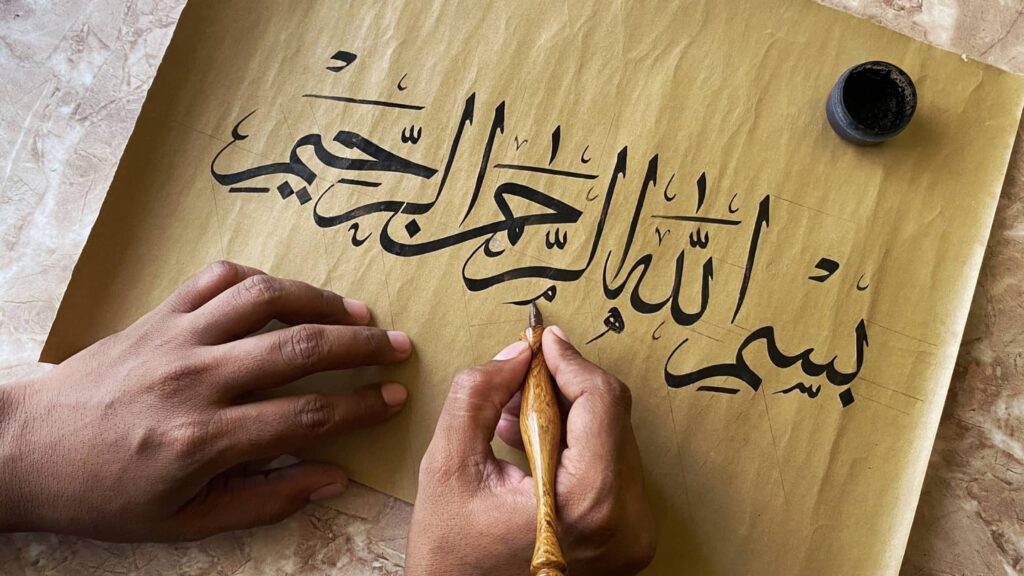
Morocco proudly embraces two official languages: Modern Standard Arabic and, as of 2011, Tamazight, one of the prominent Berber languages. While the usage of Berber has experienced a decline, as of 2012, at least one-third of Moroccans still speak Berber dialects as their mother tongue.
In addition to the official languages, French holds significant sway in Morocco and is widely spoken, particularly in business. During your time in Morocco, you will encounter the vibrant local Moroccan dialect, known as Darija, spoken on the streets. Modern Standard Arabic remains the language of instruction in schools. Spanish also finds its place in northern Morocco, particularly in Tangier.
As Morocco opens up to the world, the popularity of English is on the rise, reflecting the country’s growing international engagement and integration.
Moroccan Climate: From Coast to Inland
Situated at the northwestern tip of Africa, the Kingdom of Morocco borders the Atlantic Ocean to the west, the Mediterranean Sea to the north, Algeria to the east and south, and Mauritania to the south. The Mediterranean coast is home to the Spanish enclaves of Ceuta and Melilla. Expats residing in Morocco are likely to be found along the inviting Atlantic coast, blessed with a pleasant Mediterranean climate characterized by mild, damp winters and hot, arid summers. The rainy season typically spans from October to March. Coastal areas benefit from refreshing sea breezes, maintaining temperatures between 18 to 28°C during the summer.
Venturing further inland reveals a more extreme climate, with summer temperatures soaring above 35°C. In winter, the coast experiences average temperatures ranging from 8 to 17°C, but temperatures noticeably decrease as one travels deeper into the interior.
Morocco’s History at a Glance
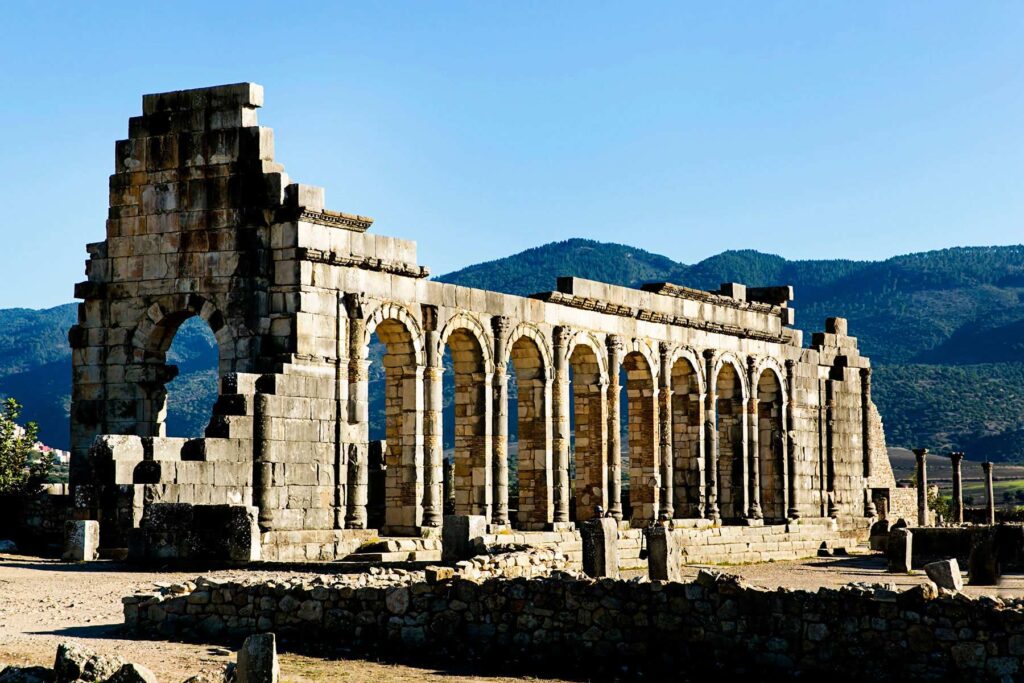
Before the Muslim conquests, Morocco was inhabited by diverse nomadic Berber tribes. In the 8th century, Arab forces entered Moroccan territories, paving the way for a succession of Muslim dynasties. The present-day Moroccan royal family traces its lineage back to the Alaouite dynasty, which ascended to power in the 17th century.
In 1860, Spain occupied northern Morocco, sparking a half-century of trade rivalries among European powers that gradually eroded Morocco’s sovereignty. In 1912, the signing of the Treaty of Fez (or Fès) resulted in France establishing a protectorate over the entire nation. This marked the beginning of the colonial period in Morocco. However, after a protracted struggle for independence, Morocco regained its independence in 1956, ending the colonial era.
Moroccan Culture: A Tapestry of Influences
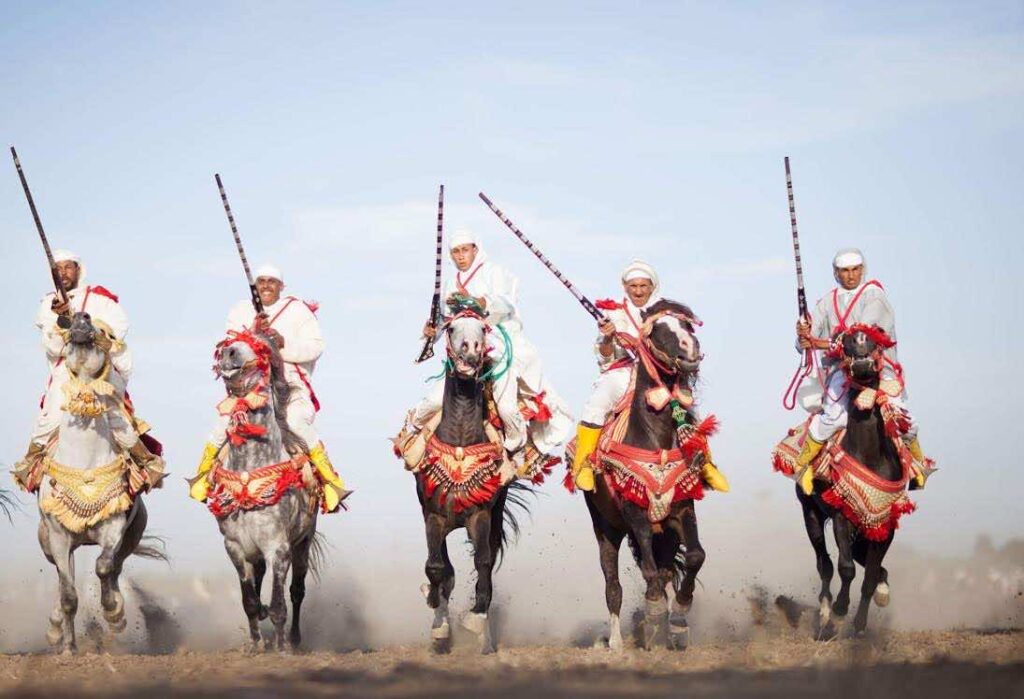
Throughout the centuries, Morocco is known for its vibrant blend of cultures, including Berber, Arab, Spanish, and French, each leaving an indelible imprint on the nation. While diverse cultural elements are evident, Islam is the cornerstone of Moroccan culture, infusing every facet of daily life, particularly during the sacred month of Ramadan.
The major cities of Morocco typically comprise an old town (Medina) and a new town (villes nouvelles). During French colonialism, the new towns were developed outside the confines of the ancient city walls, preserving the culturally rich Medinas in their authentic glory. Exploring the labyrinthine alleys of the souk within the Medina unveils a treasure trove of traditional crafts, delectable cuisine, and various wares. In the summer, cities across Morocco come alive with art and music festivals, including the renowned World Sacred Music Festival in Fès.
Morocco commemorates 13 official holidays, encompassing both Islamic and national celebrations. Islamic holidays such as Eid al-Fiṭr (marking the end of Ramadan), Eid al-Aḍḥā (the Festival of Sacrifice), and the Prophet’s birthday hold special significance. National holidays such as Independence Day, Throne Day, and the king’s birthday are also observed with pride and joy.
Social Life in Morocco: A Blend of Tradition and Modernity
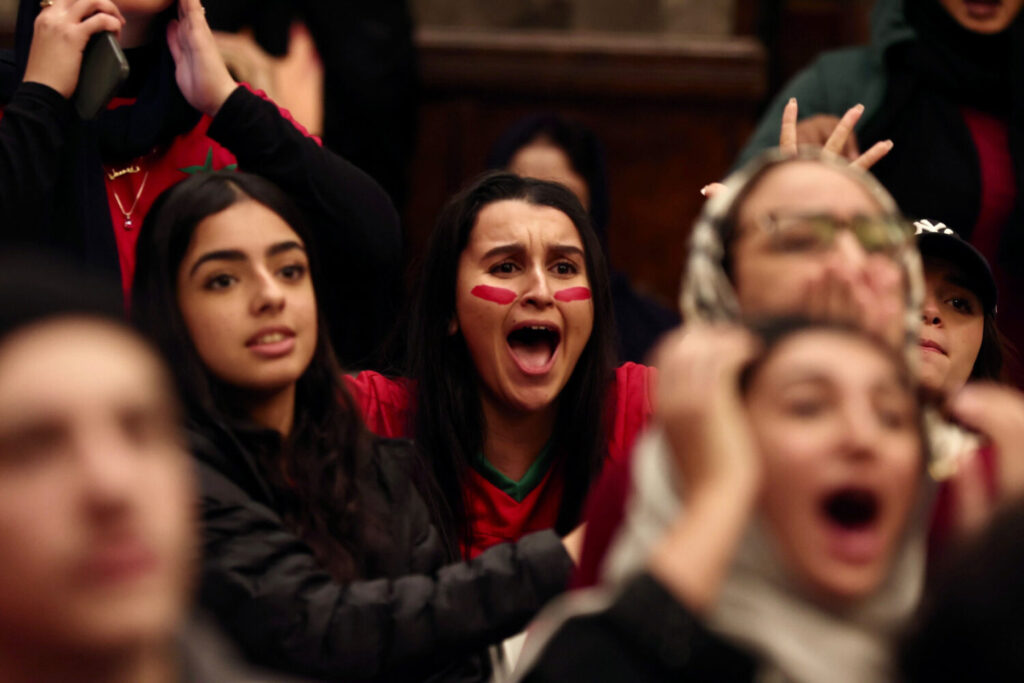
Moroccan social life revolves around the cherished values of home and family. For expats, especially those from Europe and North America, it may require some adjustment to embrace the prevailing emphasis on the collective rather than the individual.
Its conservatism and religious devotion characterize Moroccan society, yet it stands out as one of the region’s more moderate and peaceful nations. The country’s ongoing endeavors in social, economic, and political reforms make it an appealing destination for many expats. However, it’s important to note that administrative processes in Morocco often take longer compared to what one may be accustomed to in their home country, necessitating patience and understanding.
While Morocco exhibits a more liberal stance than other Muslim countries, there are still certain aspects expats should be mindful of. Homosexuality remains criminalized, as do sexual relations outside of marriage. Women are advised to dress modestly, opting for loose-fitting clothing that covers a significant portion of the body, although headscarves are generally not mandatory.
Overall, Morocco balances tradition and modernity, providing a vibrant social environment that welcomes diversity while preserving cultural values.
Respecting Islamic Traditions: Islam and Ramadan in Morocco
When visiting Morocco, it is crucial to respect the local customs and traditions, particularly those associated with Islam. It should be noted that, apart from significant tourist attractions, most mosques are restricted to non-Muslims. Devout Muslims adhere to the practice of praying five times daily— at dawn, noon, afternoon, sunset, and nightfall. The sun’s movement determines the precise prayer times and can be found in the local newspaper. On Fridays, the weekly congregational prayer occurs at midday, leading to the closing of shops and businesses during this period.
Ramadan holds great significance as the Islamic holy month. Its timing varies each year as it follows the lunar calendar. During Ramadan, observant Muslims observe fasting throughout the day, refraining from eating, drinking, smoking, or chewing gum. After sunset, families come together to enjoy a hearty feast, and the culmination of Ramadan is marked by the joyous Eid al-Fitr celebrations, which span several days.
The observance of Ramadan leads to a deceleration in the pace of daily life. Opening hours may vary, and many restaurants remain closed during the day due to decreased customers. While non-Muslim expatriates are not obligated to fast, it is considerate to refrain from eating and drinking in public during Ramadan as a sign of respect.
Moroccan Cuisine
If you’re not a fan of cumin, chances are you won’t develop a taste for Moroccan cuisine since this spice is a staple in almost every dish. The signature dish of Morocco is couscous, a pasta made from semolina, typically served with a flavorful meat stew. Preparing a traditional couscous meal is time-consuming, often reserved for Friday mornings and enjoyed after the weekly prayer service. Another national specialty is Harira, a hearty soup with lamb, traditionally savored at the end of Ramadan to break the fast.
Meat plays a prominent role in Moroccan cuisine, featuring lamb, fish, and poultry dishes. One beloved delicacy is b’stillah, a pigeon baked in delicate pastry, while another highlight is Mechoui, which involves slow-roasting succulent lamb. Commonly used vegetables in Moroccan cooking include tomatoes, peppers, onions, and eggplants. Tagine, a flavorful stew made with meat and vegetables, takes its name from the earthenware pot in which it is traditionally prepared, harking back to its Berber origins.
Dinner ceremonies
When attending a dinner at a Moroccan household, it’s essential to observe certain customs. Remember to remove your shoes as a sign of respect as you enter the house. Additionally, it’s essential to ensure that both you and your spouse have received an invitation, as conservative Muslims generally do not host mixed-sex dinner parties. As for appropriate gifts, consider bringing flowers, sweet pastries, nuts, dates, or figs. However, it’s crucial to avoid bringing alcohol unless you are sure your host partakes in alcoholic beverages.
A traditional Moroccan home typically serves meals from a shared bowl or plate. When dining, confine your eating to the portion of the dish in front of you. Eating and drinking using your right hand is customary, as the left hand is considered unclean.
Morocco Everyday Life
Despite being a Muslim country, Morocco follows the Western-style working week from Monday to Friday. The typical business day begins at 09:00 and concludes at 19:00, allowing time for prayers and a lengthy lunch break. On Fridays, businesses and shops shut down from 11:00 to 15:00 for the central weekly prayers, during which all Muslims gather at the local mosque.
Government agencies and post offices usually operate from 08:00 to 12:00 and 14:00 to 18:30, Monday to Thursday. On Fridays, their hours are from 08:30 to 11:30 and 14:00 to 18:30. Banks generally open from 08:15 to 15:45, Monday to Friday. Shops typically open from 09:00 to 19:00, with a break for lunch, and many establishments remain closed on Sundays. In major cities, supermarkets stay open until 22:00.
During Ramadan, opening hours may differ from the regular schedule. Generally, there is no designated lunch break; instead, shops and offices close earlier in the day.
Money in Morocco
In Morocco, the official currency is Moroccan Dirham (MAD), with an exchange rate of about 10 MAD to 1 USD as of October 2024. Cash remains the primary form of payment in Morocco, although major credit cards are widely accepted in larger cities. It’s important to note that ATMs often run out of cash over weekends, so it’s advisable to plan and withdraw money during weekdays. It’s worth mentioning that there are limitations on the amount of money you can bring in or take out of the country, with a maximum limit of 1000 MAD. Additionally, it is recommended to retain receipts for all transactions as per Moroccan legislation, as they may be required when converting any remaining dirhams.
When opening a bank account in Morocco, you can choose between a convertible dirham account and a regular dirham account. A convertible account allows for the deposit or transfer of foreign currency exclusively. You’ll need a passport and an initial deposit to open a bank account. Once you acquire your residence permit, you can opt for a regular dirham account if desired. A debit card can accompany this account, but its usage is limited to within Morocco.
For further information please visit our Morocco travel guide.






